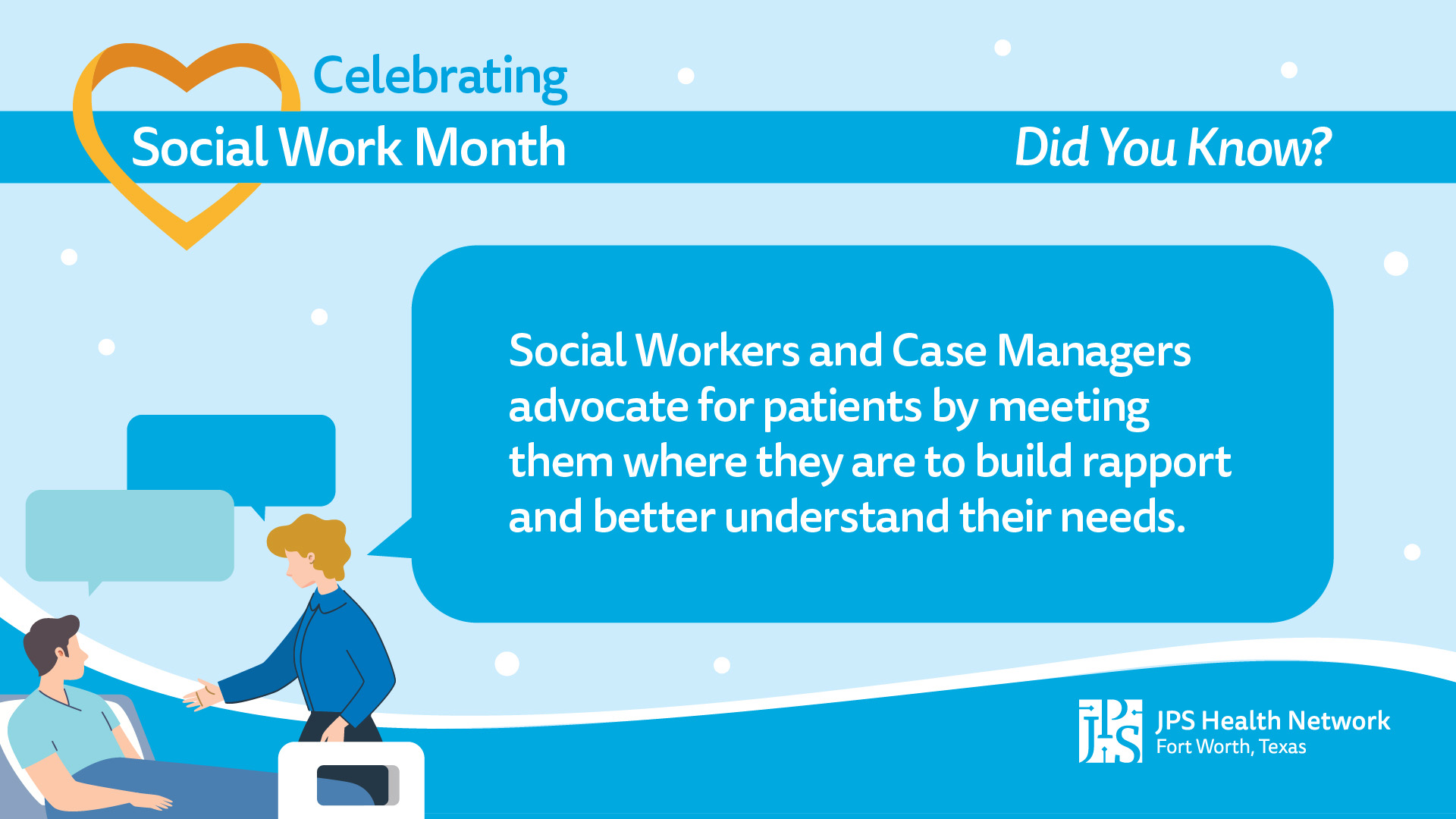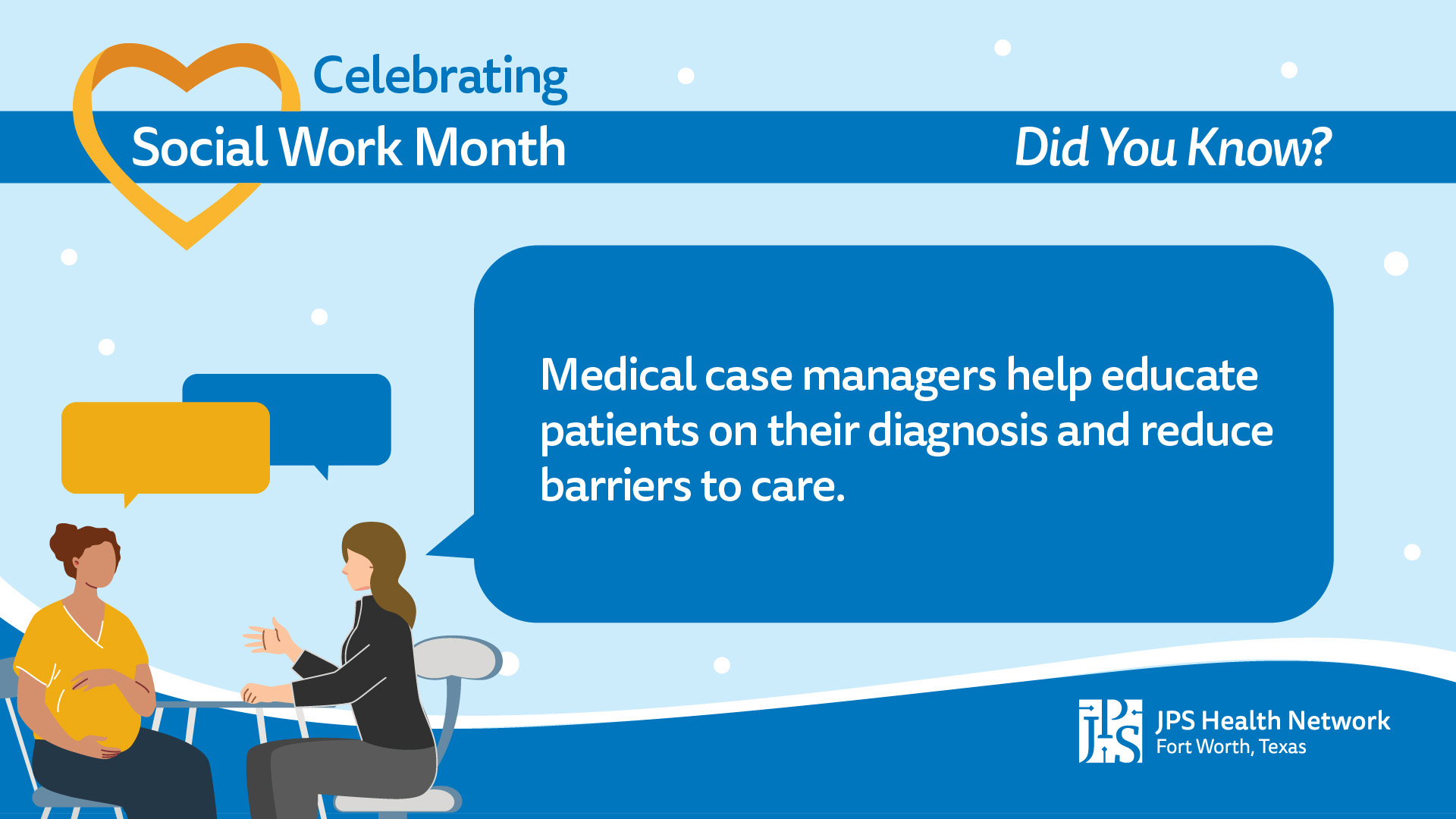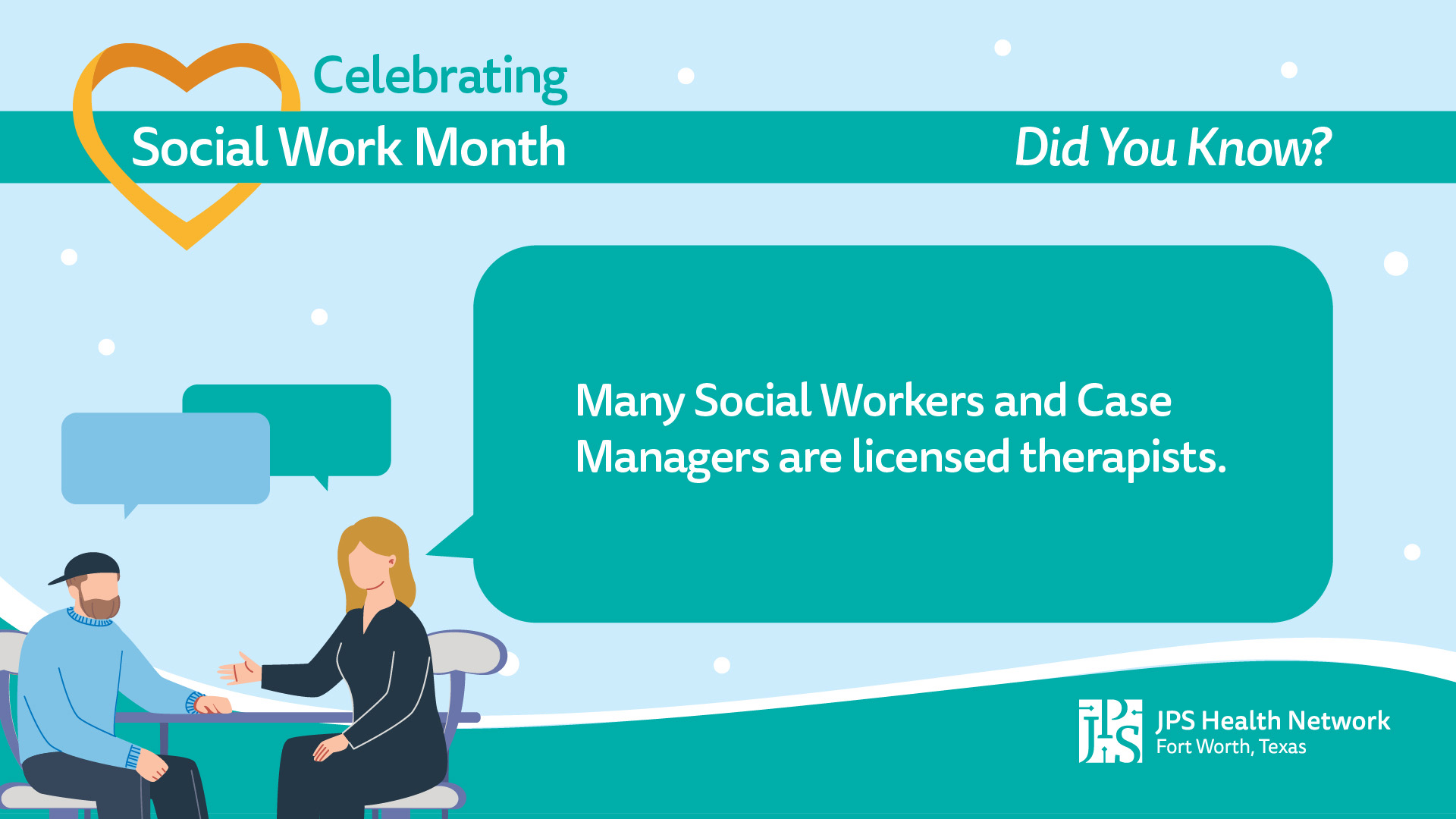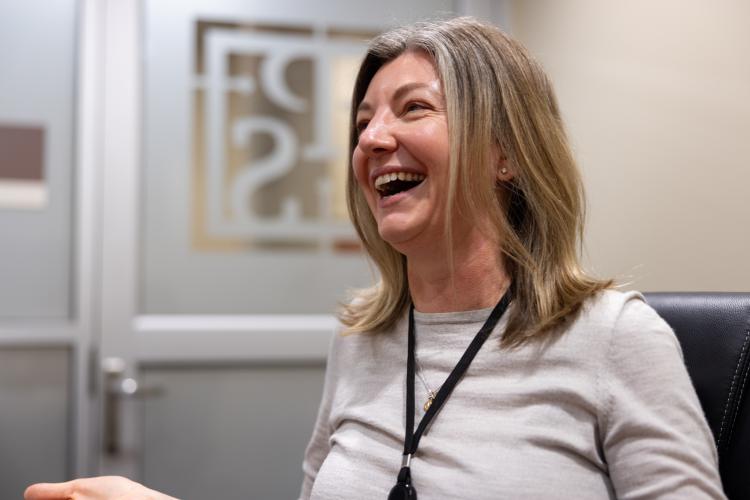
Social workers are compassionate advocates who provide guidance to patients in need, whether it's related to physical health or mental health. They help patients have difficult conversations, gain a deeper understanding of their situation, provide medical resources, or simply lend a listening ear. The bond between a social worker and their patient is special because it often takes time to build rapport and establish trust.
The initial interaction between a social worker and a patient is crucial in determining the most effective approach to treatment. While some patients are open and receptive to receiving help, others may be hesitant to trust and may require more time to establish a positive relationship. JPS Health Network has several social workers and case managers available to assist, depending on the patient's specific needs.
"The case manager or social worker is going to be working more on the discharge planning," Jennifer Radke, LMSW, Social Worker, Palliative Care, said. “They're going to be helping patients in the hospital connect with resources out in the community, so they know what to do at home to stay successful and not have to come back and forth to the hospital. The behavioral health social worker helps in group settings, assessments, and discharge from the facility. A social worker in Palliative Care provides emotional support. They help families who are struggling with their family member’s new diagnosis or help the patient themselves with a new diagnosis. These are life-changing, so we help and get involved."
JPS has many social workers and case managers who specialize in different areas, but they all share the same goal of meeting patients where they are. They understand the importance of addressing patients' current needs and tailoring their methods to provide the best care possible.
"I'm proud I get to play a role in someone's growth. I would say I am definitely a ‘social worker to the core,’ and seeing others heal well, feel well, and experience joy keeps me going.”
"I had a patient who was a younger lady; she was always short with me, a bit grumpy, and did not trust me,” Radke said. “I just tried to meet her where she was, and I asked her, 'Is there something I can do for you right now,' she said that no one had given her any water. So, I got her water, and she gave me a list of concerns. I went through all of them, and she remembered me when I came back the next day. She said, 'You got my stuff for me.' She ended up talking to me, and we built a relationship."
Radke recognized that her patient was dealing with a difficult diagnosis and that building a rapport with her was crucial. By creating a safe and accepting environment, Radke was able to help her patient in a meaningful way. Their relationship grew stronger, and the patient shared that she was facing her last Christmas with her young son and was unable to buy him any gifts. Radke helped the family connect with Project 4301, which provided her with a budget to purchase gifts for her son. The patient's son opened his gifts in her hospital room, creating a memorable experience for the family.
"When I returned from Christmas, they showed me pictures and videos of him opening his gifts, and they were crying. It was such a wonderful gift because that was her last. She ended up going home on hospice," Radke said. "It was really special to me because had I not tried and assured her that 'Hey, I care about you, and I understand there may be some rough edges, but I'm serious about meeting your needs, and I'm here for you,' she wouldn't have trusted me to share what she really needed."
As a social worker, individuals can establish genuine connections with their patients. This is because they share a mutual understanding that they want the best for their patients and are willing to provide them with the necessary support to lead healthier lives. Nicole Lee, LMSW, Mobile Health Social Worker, Acclaim Street Medicine, and her team take the phrase "meet the patient where they are" literally by traveling to various locations both north and south of I-30 to provide medical care and support to patients experiencing homelessness.
"It's important to meet patients where they are because the patients, we serve have challenges accessing care," Lee said. "Being able to meet them and help them navigate the systems, our system at JPS and community resources is essential to providing the best care. We are here to help advocate for their needs and make it easier for them to access care while also demonstrating that we are willing to come out and meet them where they are. This shows that we aren't limited by the walls we're in. We are coming to them because they are valuable to us, and we want to extend that hand to them."
Lee is committed to helping patients in any way she can. She works hard to connect them with the appropriate services; even if she doesn't have an immediate answer, she will find one. She takes pride in her work and finds assisting those who need it most rewarding.
"This position is special. I enjoy making it easier for patients because they are living in the circumstances that they are in, so whatever I can do to help minimize worries and give them less stress is important to me," Lee said.
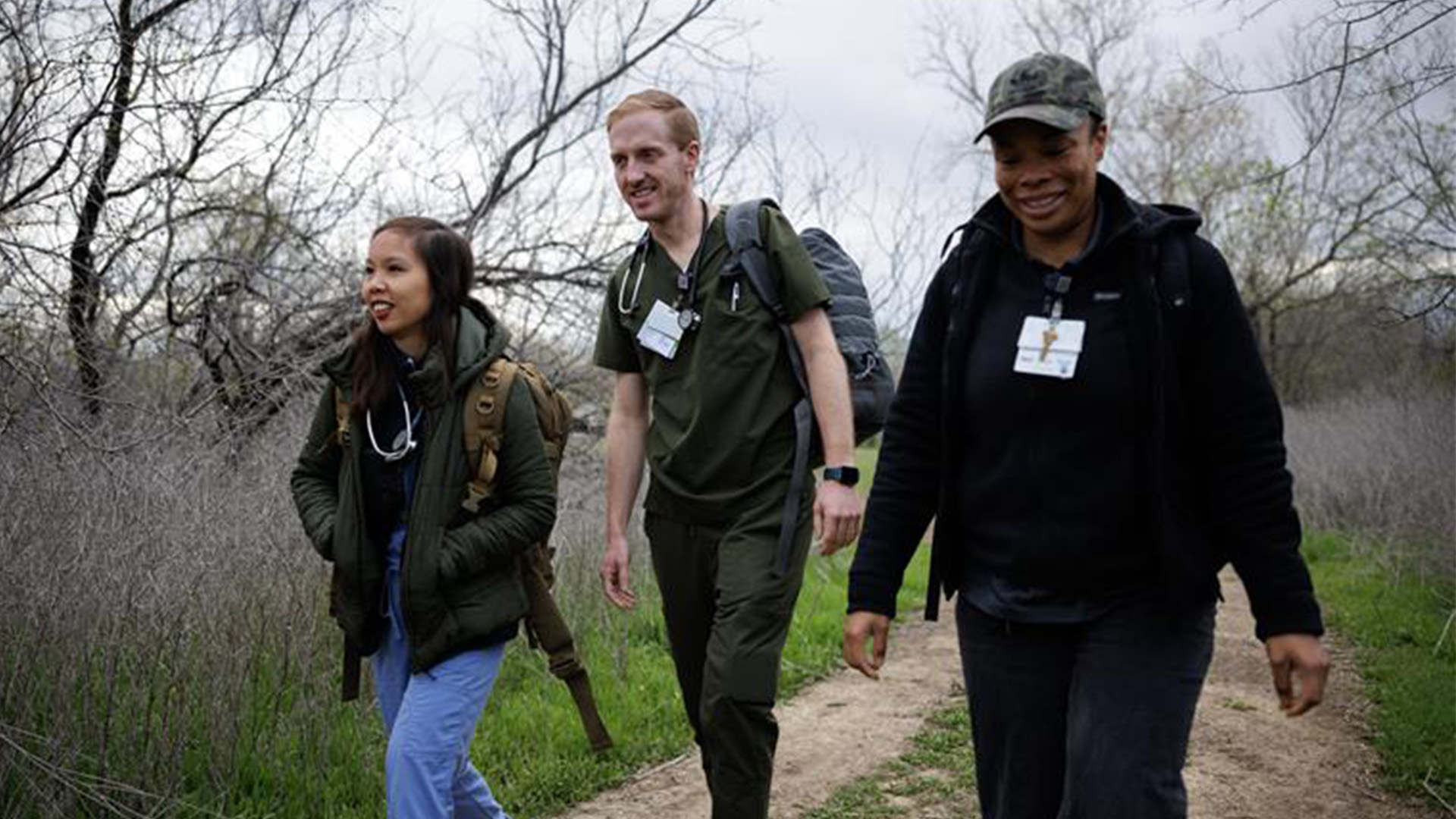
The social work profession is multifaceted and provides services to various specialties across the hospital system. At JPS Healing Wings & Infectious Disease Clinic, case management social workers play a crucial role in maintaining patient health. They work to minimize barriers to care and ensure that HIV patients have access to all the resources they need to keep their condition under control.
"The case managers here are all social workers, so we collaborate with the patient and their treatment team to help educate and empower them so they can learn about their diagnosis and how to navigate it independently because it can be a scary diagnosis," said Danielle Call, LCSW, Case Manager-Ryan White, Healing Wings. "I strive to make patients feel confident in their ability to play an active role in their health care journey. Individuals living with HIV can live long, happy, healthy lives, and I want to help them do it."
There is a stigma associated with speaking about HIV, which makes it difficult for patients to share their diagnosis. The impact of this condition is not just limited to the patient but also affects their families. Therefore, it is crucial to educate people about this disease. Sometimes, patients feel ashamed, guilty, or embarrassed about their diagnosis and may not want to talk about it. In such cases, case managers work with patients to alleviate these feelings and help them cope with their diagnosis.
"I enjoy educating patients and their families about HIV treatment and care and helping them learn how to successfully navigate the HIV healthcare system because this can happen to anyone," Call said. "I had a patient who was reluctant when they'd come in and wouldn't make eye contact with me. They were dealing with their own stigma and processing everything. I explained that you just have to know what to do to protect yourself. Now, they're a new person, and when I talk to them, they joke with me, and they're open about their prescription and appointment needs."
Due to their therapeutic background, social workers can make patients feel heard and understood. This is especially critical as the demand for behavioral health services is rising. JPS has integrated behavioral health resources into its clinics to meet this need. This approach allows patients direct and easy access to these resources without scheduling an appointment. For Courtney Wilson, LMSW, Embedded BH Specialist, the combination of social work and behavioral health expertise enables her to offer support and advocacy to patients anytime and provide a therapeutic approach to help them address their emotions.
"They embedded behavioral health specialists in a few of the clinics, so when a person comes in to see their primary care physician, I'm available right then," said Wilson. "The doctor can pull me into the room for brief interventions or even suicide assessments. I can help with emergencies, getting someone to the next level of care, connecting them to resources, or act as a consultant with the medical team to assess symptoms and figure out the appropriate treatment. It's a way to help a patient come to one appointment and have many different needs met."
Wilson interacts with many patients daily, and she has developed strong connections with each one of them. One of her regular patients, Billy Youngblood, has been receiving care with her for a while. Youngblood expressed his gratitude towards Wilson for being his social worker and providing him with excellent care. Wilson has built a strong relationship with Youngblood over time, to the point where he trusts her completely. When Youngblood was lonely and searching for a family connection, Wilson was able to provide support and help him understand his feelings. The openness in their sessions proved invaluable when Wilson was able to step in before Youngblood was about to make potentially a bad decision.
"I was able to do a brief intervention with him and listened to how he felt," Wilson said. "I acknowledged that it's hard and helped him process what that feels and normalized it. I helped him put words to his experience. I am so grateful to have a job where I can prioritize these moments with patients and have the therapeutic background to help address these feelings and give that support."
Social workers are uniquely able to establish a strong bond with their patients, enabling them to offer the best possible care. They actively listen to their patients' needs and concerns, which can be life-changing regardless of the diagnosis or treatment. Social workers are willing to collaborate with patients and provide support, even in cases where patients initially resist. Their approach is successful because they have a genuine heart of service and truly care about their patients' entire well-being.
"As a social worker, one of the many things that makes me proud is seeing the patients I work with graduate from case management because they have met all their goals and are doing incredibly well," Call said. "I'm proud I get to play a role in someone's growth. I would say I am definitely a ‘social worker to the core,’ and seeing others heal well, feel well, and experience joy keeps me going.”

